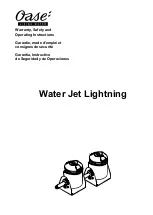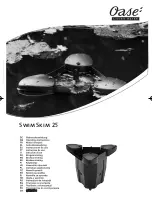
7
www.strata.co.nz
ADVANCETIG 200
4T Mode Additional Controls
End Current Setting (21)
Available in 4T trigger mode, sets a welding current
5-100% of the main welding current activated when
the trigger is held on to ‘unlatch’ the trigger before the
weld is finished. If downslope (22) is set, the current
will go through the downslope period before going to
the end current set. When the trigger is released, the
arc will stop.
Start Current Setting (29)
Available in 4T trigger mode, sets a welding current
5-100% of the main welding current activated when
the trigger is held on to ‘latch’ the trigger before the
main weld current is started. Once the trigger is re-
leased, the current will go through the upslope (30)
period if it is set, to the main welding current (31).
Pulse Settings
Only available when pulse mode (26) is selected.
Pulse Frequency (23)
Sets the rate that the welding output alternates be-
tween the peak and base current settings.
Pulse Width (24)
Sets the time proportion as a percentage between
the peak current and base current when using pulse
mode. Neutral setting is 50%, the time period of the
peak current and base current pulse is equal. Higher
pulse duty setting will give greater heat input, while
lower pulse duty will have the opposite effect.
Current Control (25)
Sets the current of the low/ base pulse.
MMA Settings
Hot Start (34)
Hot start provides extra power when the weld starts
to counteract the high resistance of the electrode and
workpiece as the arc is started.
Arc Force (32)
An MMA welding power source is designed to pro-
duce constant output current (CC). This means with
different types of electrode and arc length; the weld-
ing voltage varies to keep the current constant. This
can cause instability in some welding conditions as
MMA welding electrodes will have a minimum voltage
they can operate with and still have a stable arc.
Arc Force control boosts the welding power if its
senses the welding voltage is getting too low. The
higher the arc force adjustment, the higher the mini-
mum voltage that the power source will allow. This
effect will also cause the welding current to increase.
0 is Arc Force off, 10 is maximum Arc Force. This
is practically useful for electrode types that have a
higher operating voltage requirement or joint types
that require a short arc length such as out of position
welds.
Tips and Tricks
Pulse Welding
Pulse welding mode switches the welding output be-
tween a high and low current output in a cyclical man-
ner. When used correctly this function has substantial
benefits in the TIG welding process including greater
weld penetration for less work heat input and greater
control of the weld pool.
The basic theory for setting the base current using
pulse mode is that the base current should be suffi-
cient to maintain the existing molten weld pool, while
the peak current is sufficient to melt new metal in or-
der to move/ expand the molten weld pool. Increased
pulse frequency will have the effect of making the arc
more tightly focused which is useful for fine stain-
less work and similar. Pulsing can also be used to
help move the weld pool, this technique is useful for
welding out of position or with materials that have
higher viscosity weld pool. Higher pulse duty setting
will give greater heat input, while lower pulse duty will
have the opposite effect.








































